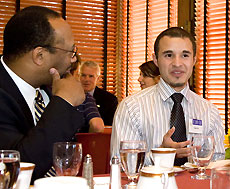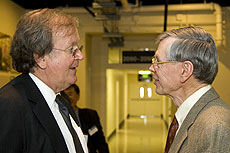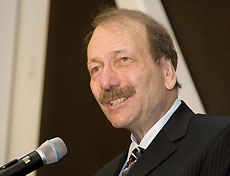By Guy Lasnier
UCSC’s success with leading-edge scholarship and interdisciplinarity was the theme as members of the UC Board of Regents visited Santa Cruz Oct. 18 and 19 in a whirlwind tour with stops on campus and at the Silicon Valley Center in Sunnyvale.
Read statement from Acting Chancellor George Blumenthal and Campus Provost David Kliger on the Regents' visit and the protests.
|

The Regents' visit included opportunities for Regents to talk with UCSC students at a dinner Wednesday evening. Faculty representative to the Regents Michael T. Brown, left, talks to student Luis Gil. (Photos: Matt Fitt) |

Regent Peter Preuss, left, confers with Patrick Mantey, Jack Baskin
Professor of Computer Engineering. |

Acting Chancellor George Blumenthal addresses the Regents. |
The Regents last visited UCSC in February 2002.
Acting Chancellor George Blumenthal welcomed the Regents by saying “modern challenges demand new ways of looking at the world.’’ UCSC is uniquely positioned to respond with its interdisciplinary focus, he said. “Traditional disciplines are not enough to address relevant research problems.”
Blumenthal said the visit was successful, but that he thought opportunities were missed to fully showcase the campus, its programs, students, and faculty because of disruptions outside the new Humanities Lecture Hall Wednesday afternoon where the Regents held the first of two public comment sessions.
Two students and one nonstudent were arrested for disturbing a public meeting and resisting arrest. One of the students was also arrested for battery on a police officer.
The Regents--five appointed members and six others from the 26-member board--heard comments from community members and students during the 20-minute public session. They were joined by other UC officials. After Blumenthal’s welcome and overview, Campus Provost and Executive Vice Chancellor David Kliger outlined the six broad areas of inquiry in UCSC’s academic plan.
Kliger said the plan was developed “bottom up,” from individual academic plans written by each division. He and Alison Galloway, vice provost for academic affairs, looked for common themes across the divisional plans. The six major themes that surfaced are: Advanced Technology and Society; Communication and Visual Media; Environmental and Planetary Health; Human Health Studies; Identity and Heritage Studies; and Transnationalism and Globalization.
Tours and presentations by students and faculty of Digital Arts and New Media and the Center for Justice, Tolerance, and Community were cancelled because of the events outside the Humanities building.
“As a result, our visitors missed several planned presentations of the exceptional work of our students and faculty,’’ Blumenthal said. “An opportunity was lost to impress them even more.”
In his keynote address Wednesday night, Blumenthal spoke of his own career as an astronomer and how he benefited from UCSC’s interdisciplinarity and “nimbleness to take advantage of new ideas and opportunities.”
“UCSC’s history is characterized by the same nimbleness and interdisciplinarity,” he said. “Those same principles continue to make this campus an ideal place for faculty, graduate students, and undergraduate students to do cutting-edge research.”
Peter Preuss, the presiding Regent, said Thursday that he and his colleagues were very impressed with UCSC and its programs.
Thursday morning, the Regents met with students and heard Vice Provost and Dean of Undergraduate Education William Ladusaw describe UCSC’s unique living and learning environment in the colleges. “What was considered experimental at UCSC in the 1960s and '70s is considered best practices today” at colleges and universities nationwide, Ladusaw said.
After another public session Thursday morning in which students, faculty members, and residents spoke for 20 minutes, the visitors traveled to UCSC’s Silicon Valley Center.
At the NASA Ames Research Park at Moffett Field, Regents heard presentations by Dean of Engineering Sung-Mo (Steve) Kang and Physical and Biological Sciences Dean Stephen Thorsett and other faculty members, graduate and undergraduate students.
There, Computer Science Professor and Chair Ira Pohl told the Regents that the new computer game design major was a successful effort to turn the tide of a decline in engineering enrollment after the dot-com bust. UCSC already had all the academic components in place to create a rigorous program, he said.
Computer games go beyond the realm of just games to a form of interactive entertainment that will replace motion pictures in the 21st century, Assistant Professor of Computer Science Michael Mateas said while demonstrating his Façade game, which features his research in expressive artificial intelligence.
Other presentations were given on Climate Change and California’s Future, by Vice Provost and Dean of Graduate Studies Lisa Sloan; Biology of Stem Cells by Professor Douglas Kellogg; Biomimetic MicroElectornic Systems by Professor Wentai Liu; Genome Project by Professor Phillip Berman; The Digital Divide by Associate Professor Robert Fairlie and a demonstration of “Clarissa,” a voice-operated computer system, developed by visiting Linguistics Professor Beth Ann Hockey.
Two undergraduate students took part in a health sciences roundtable discussion with the Regents.
Vice Provost for Silicon Valley Initiatives Carl Walsh closed the visit at a luncheon Thursday attended by about 75 Silicon Valley officials and industry representatives. “Silicon Valley presents a tremendous opportunity for collaborative research and for developing innovative educational programs,” Walsh said, outlining the scope of UCSC’s efforts. “UCSC is leading the effort here to expand research and educational partnerships for all of UC.”
Attending the Oct. 18-19 Regents visit were appointed Regents Peter Preuss, William De La Pena, Judith L. Hopkinson, Odessa P. Johnson, Leslie Tang Schilling, and ex-officio Regent Steve Schreiner, vice president of the UC Alumni Associations.
Also attending were: Benjamin Allen, student Regent designate; Eleanor Brewer, secretary of the Alumni Associations of UC; Philip J. Bugay, treasurer of the Alumni Associations of UC; and faculty representatives John B. Oakley, chair of the Academic Council, and Michael T. Brown, vice chair of the Academic Council.